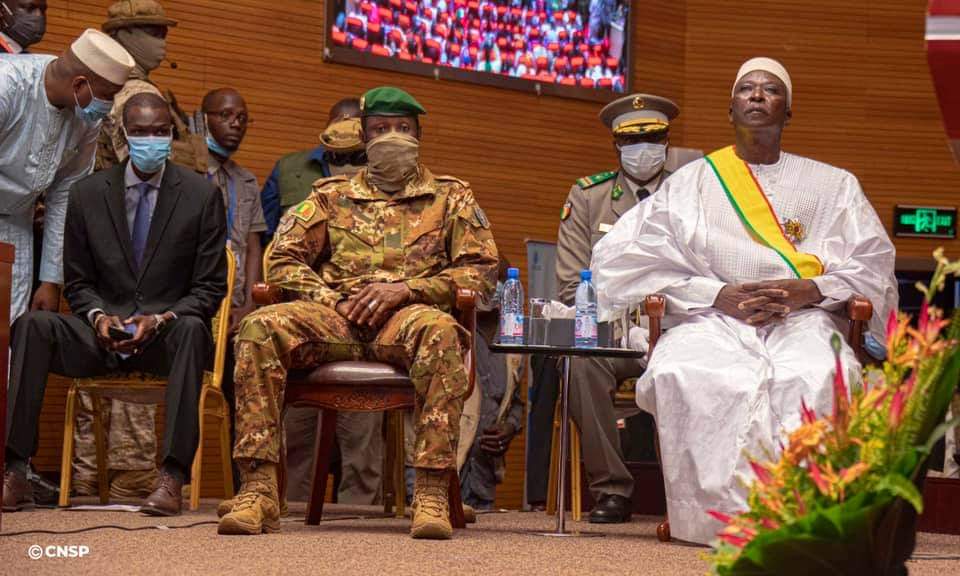The West African regional bloc Ecowas continue to maintain sanctions on Mali hours after Retired Colonel Bah N’daw and serving Colonel Assimi Goïta took the oath of office as President and Vice President respectively to lead the country to general elections.
Mali has turned a new page from Ibrahim Boubacar Keïta (IBK).
A little more than a month after his overthrow by the army, the former French Sudan officially begins an 18-month political transition at the end of which general elections (legislative and presidential) are to be held.
Bah N’daw, dressed in white and Assimi Goïta, in military clothes, were publicly sworn in at the International Conference Centre of Bamako (CICB) before the president of the Supreme Court, Wafi Ougadeye Cissé.
The latter addressed the two authorities of the transition in these terms: “Your people thirst for peace, security, stability, national unity, harmony, social cohesion and justice”.
Bah N’daw promised, in his inaugural speech, to be “always available” for his country because “serving Mali is a privilege and it must be an honour.”
The former Defence Minister under IBK, now 70 years old, said he could not “escape the call of duty” despite the weight of years and the comfort of retirement.
The man, whose designation was not contested said he is comfortable with being a “submissive slave of Mali” a country that he said gave him everything.
According to the president of the transition, the hour is serious enough to require each citizen to contribute his small stone to the consolidation of the national edifice: “The common house is shaken, weakened, humiliated. It has been shaking in its foundations for at least a decade. And we cannot continue, to keep our heads in the sand and to repeat without trying to prevent the shipwreck, to convince ourselves that the ship could pitch but would never capsize. It can capsize and it will capsize if we keep on rocking it”.
Retired Colonel Bah N’daw invited his fellow citizens to join hands and think deeply together to rebuild Mali’s democracy so that the country can survive “as a state, as a nation.”
However, the acting president is aware that the transition cannot solve all problems.
Thus, he argued, “it must set priorities. Ours have been discussed, validated and recorded in the National Charter of the Transition that emerged from the period of consultation of September 10, 11 and 12.
“It is this charter that will constitute my breviary and if I have to give my life so that the transition is successfully completed, I will not hesitate for a second. I am ready to make the sacrifice” he said.
The native of San, in the Ségou region, said that his “greatest satisfaction will lie in handing over to the future president of Mali elected properly and indisputably.
To get there, he advocated without delay “a deep reflection on the shortcomings of the electoral process, in order to provide us with good texts, good practices, and strong counter-powers”.
In this context, he pledged to fight without concession “elections at astronomical costs, electoral fraud, vote buying, and the inclusion of the administration into the electoral process and the perversion of results for the Courts of Arbitration.”
Such a mission, he noted, will be carried out on the basis of the merciless war that must continue to be fought against terrorist forces and organised crime.
In order to win this asymmetric war totally the former Defence Minister stressed the importance of “equipping ourselves with the most dissuasive means possible through a seasoned army, materially supported and morally prepared.”
To this end, good management of resources will be one of the priorities during the transitional period.
He took the oath before an array of distinguished personalities among them, the very influential Imam Mahmoud Dicko, moral leader and head of the popular protest movement that led to the forced resignation of President IBK, Dioncounda Traore, former president of the transition between 2012 and 2013, Goodluck Jonathan, the chief mediator of the Economic Community of West African States (ECOWAS).
Umaro Sissoco Embalo, the President of Guinea-Bissau was the only foreign head of state to attend the inauguration ceremony.
To date, ECOWAS has not lifted the economic sanctions against Mali.
The measures decided against Bamako following the 18 August coup d’état should be lifted as soon as a civilian Prime Minister is appointed, according to the regional organisation.
ID/te/lb/as/APA


